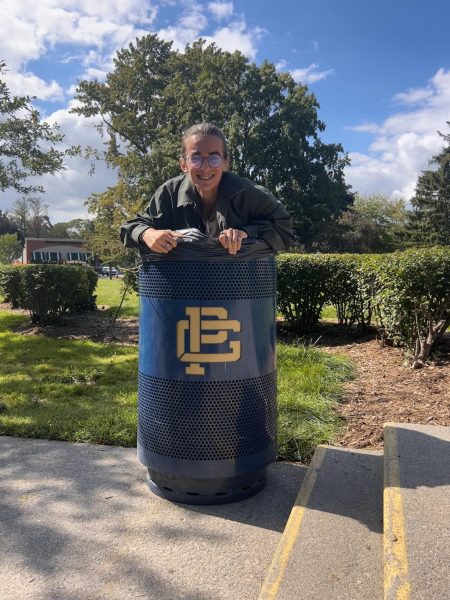2023 closed with a record-high 600 mass shootings. Many have since claimed recent generations are desensitized to gun violence, asserting that attention is drawn to other issues, and the impact of mass shootings has been regulated to a state of normalcy and complacency rather than an issue to immediately rectify.
South students like Isidro Verzosa ’24 is of similar beliefs.
“Since we have (daily) reports hearing about gun violence, whether that be school shootings or mass shootings in public spaces,” Verzosa said. “Just even hearing that every day is a huge contribution to our desensitization.”
Verzosa said many will find that, out of all generations, Generation Z is the most desensitized. He said past generations were not subject to the hysteria of mass shootings that today’s children are. To Verzosa, substantial time is spent during class and other school activities by frightened students thinking about the topic of how to deal with shootings at school.
“Past generations didn’t walk into school wondering ‘Is today going to be the day somebody snaps?’” Verzosa said. “I don’t think other generations walked into school and took a mental note of all their exits and what they should do in the case of (a) shooting.”
People like psychology and English teacher Katherine Parent agree with Verzosa, citing Generation Z as more desensitized to gun violence than past generations by proxy of the number and pervasiveness of shootings in past years.
“With the prevalence of school shootings and how in the last 10 years they have exponentially become more common, sadly, it’s just human nature that when things become more common, we tend to become desensitized to them,” Parent said.
However, Parent said she hopes that some good may derive from the sheer number of mass shootings. As future leaders take a look at today’s issues while they are children, they can take their experiences to heart as new political and social leaders rise to the public forefront.
“When I was growing up, school shootings weren’t unheard of but they were kind of rare,” Parent said. “Because a lot of people didn’t have personal experience with (shootings), they didn’t care very strongly. I hope that many people (today) have been touched that maybe there will be more of a call to action.”
In contrast, students like Verzosa think action across the board should be taken now, rather than relying on future generations. Verzosa said he believes current political leaders are not doing enough to combat gun violence and mass shootings.
“(People) doing these shootings are not getting the help that they need from the systems in place,” Verzosa said. “Whether that be mental health or physical health, they’re not receiving (it) from their families, their schools or anyone. There needs to be more systems in place to help these people and prevent violence.”
Vezrosa said, that, by living outside the United States, he has experienced the issue of mass shootings in a significantly different manner.
“There (were) very different gun laws when I was in Taiwan,” Verzosa said. “They didn’t even allow us citizens to carry firearms. When there was a threat, I remember they closed down school for that day and thoroughly investigated before letting students come back.”
According to Parent, there may be consequences from the repeated news coverage of shootings and time spent bringing light to mass shootings, possibly resulting in a repetition of the same violence.
“The widely held belief was that watching other people be aggressive drained us of our aggressive tendencies,” Parent said. “After the Bobo Doll Experiment, we learned that it is the exact opposite. When we see other people engaging in aggressive behavior, it makes us feel more aggressive. That’s part of why this has become kind of a contagion effect: humans are inherently social creatures.”
Others, like Acorn Kish ’26, feel disappointed and exhausted when it comes to further school shootings.
“There’s no shock to (shootings) anymore,” Kish said. “I just feel disappointed about the environment that we live in. Why are the adults that are supposed to be responsible still not doing anything to prevent this?”
As mass shootings and school shootings become more prevalent, Kish said they has found mass shootings and the time spent in preparation of one a new normal.
“It’s weird to think about the fact that people didn’t have to do lockdown drills since elementary school or worry about going to school every day knowing that there’s that possibility that it could be your last,” Kish said. “For us, it’s routine.”
Some people, like social studies teacher Chris Booth, still hope that school shootings will not become the new normal.
“There was something like (600) mass shootings last year,” Booth said. “If you’re anybody living today and you hear this, it’s tough to hear, and yeah, it’s normal. I’m never going to get used to that, but I can understand why people just go, ‘Well, (it) just keeps happening.’”
Adin Marshall ’25 said he agrees, hoping that people will learn to overcome the issue of shootings rather than stay complacent in their presence.
People (have) become more used to (shootings).” Marshall said. “I don’t think people are more okay with it happening, (but) I think people have found a way to cope with it being a part of our (society).”
Despite this, Marshall said he still recognizes the alarming behavior of students complacent in the presence of mass shootings, ignoring the school-wide drills inside of South.
“We had a lockdown (at South last month),” Marshall said. “In my tutorial, one kid was trying to use the restroom and go outside of the classroom. When the teacher said he couldn’t, he was mad at the fact that we had a lockdown and wasn’t concerned at all.”
Marshall said he finds that, as shootings are still happening and as people find a way to reconcile them, changes aren’t being made.
“Looking at the coming years, it doesn’t seem like it’s slowing down,” Marshall said. “I think with how politically charged our society is right now, it has resulted in a high number of shootings. Any time people will propose restrictions on who can have access to weapons, people will lose their mind over it.”












































































